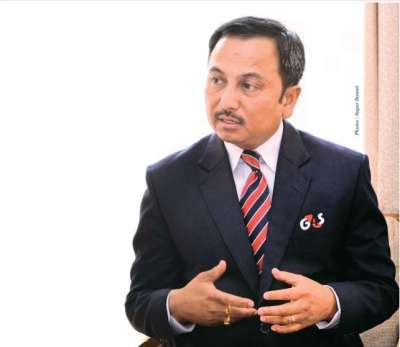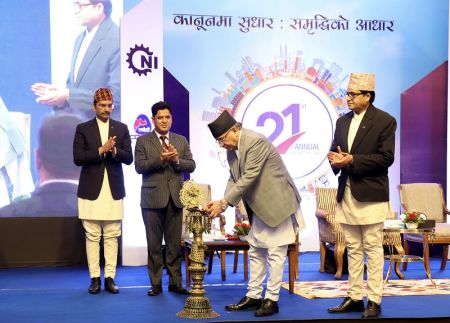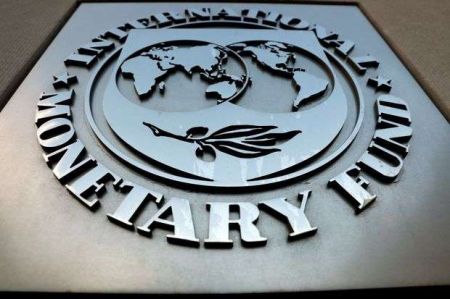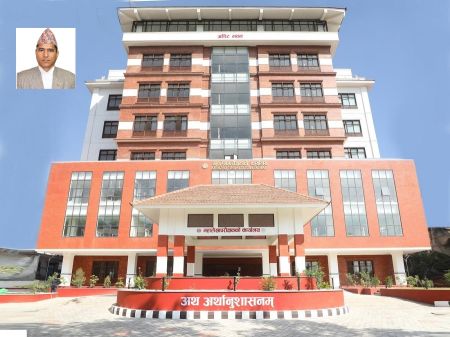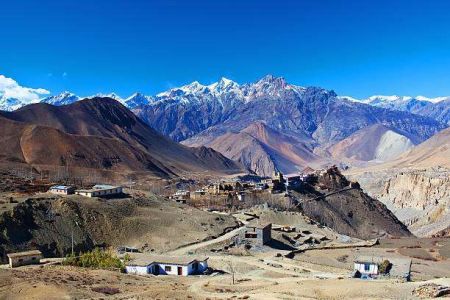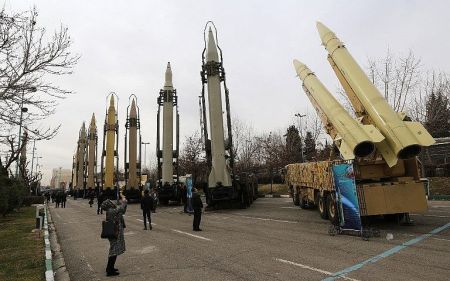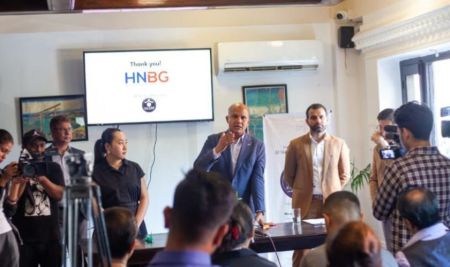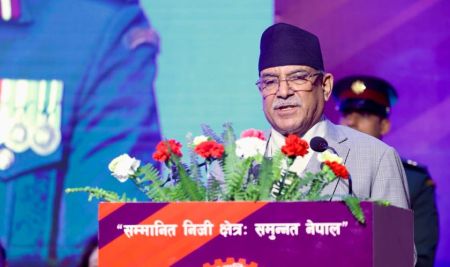Though a businessman, he is well known in political circles. Entering the business world at the age of 14, Ajay Raj Sumargi, Chairman of Mukti Shree Pvt Ltd, has many successes under his belt. Shifting between political and business circles, and from one business sector to the next, Sumargi makes an interesting business personality in Nepal. His favourite sector at the moment is hydropower which, according to him, is the one that can change the economy of the country for the better. He does not try to hide his interest in politics and ways he interacts with political forces in order to develop a common minimum understanding among political leaders. “Yes, leaders come to me and request to play the role of mediator when there are disputes and differences among them,” he reveals. Sumargi talks to New Business Age’s Siromani Dhungana about his journey and perspective on business in Nepal. Excerpts:
Can you please share with us your journey from being a local businessman outside of the valley to a renowned and one of the richest ones in the country?
I was 14 when my father passed away. Our family was already renowned for business at that time. We were involved in various businesses such as transportation, mines and wood works. My mother was always worried about my studies owing to my involvement in business from a very young age. I was responsible toward my younger brothers and we were liable to huge bank loans at that time.
In 1978, I was liable for a bank loan worth Rs 1.1 million because I had taken over all responsibilities of my father’s business. I must confess that I am not a first generation businessman - all I did was continued the businesses initiated by my father. I cleared all my banks loans by 1986 and was able to own a car at that time. All my success today is due to my hard work in those days.
You entered the business world at a very young age. How did you cope with challenges in business?
I was born in a very prosperous and educated family that had great influence at the local level. I cannot forget the contribution of my predecessors for my progress. Similarly, I got many opportunities, warmth and cooperation from society due to my father’s fame.
Another reason for my success is my readiness to take risks in business. For instance, I bought a loader worth $60,000 around 1993. At that time most people suggested that I buy a truck instead because the profit attained from trucks was more secure compared to loaders. However, my decision of purchasing a loader paid back and proved to be a right within six years as I was able to reap profit and invest it further in other projects. As a businessman, I always took risks and my readiness to bear risks has benefitted me thus far.
Generally, I change my sector every 11-12 years. In the initial 10 years, I was involved in the business of wood mills; after that, I moved on to the business of mines; later, I got involved in the telecom business and have been in it for the last 10 years.
So, which sector do you anticipate engaging in the next 10 years?
It is obviously the hydropower sector I want to concentrate in the coming decade. I have planned to invest in a 35MW hydropower project in Dhading district. I will also put my energies to bring foreign investment in the hydropower sector.
I had planned to construct a large capacity hydropower project in Karnali when Pushpa Kamal Dahal was Prime Minister. But it could not start due to hassles at the political level. I have put hydropower in my priority list and I think my presence will have a positive impact just as in the telecom sector. My contribution to make the telecom sector competitive and cheap has proved that I can create positive impact in business.
Private sector investment in hydropower has been a much hyped issue. In your opinion, what are some major problems impeding the big hydro hope?
There are many problems in the hydropower sector. First, we have entrusted the responsibility of production, transmission and distribution work to the same agency - the Nepal Electricity Authority (NEA). In my opinion, a single government agency cannot carry out all these responsibilities. The government’s role should be limited to the monitoring of the entire sector whereas work of production, transmission and distribution should be given to the private sector. But the government should provide some sort of subsidy to develop this sector. Another major problem is in transmission. The existing transmission line is not sufficient to supply electricity to households connected to the grid. The line cannot supply power even if sufficient power is produced. Lack of an effective system in NEA and lack of appropriate policies and laws have also affected the development of the hydropower sector.
The private sector is also blamed for malpractices in the hydropower sector. What is your say?
It seems the private sector has been publicity-oriented to some extent. Hoarding of hydropower licenses is a serious malpractice on the part of the private sector. Such trends tarnish the reputation of the private sector. The government should revoke the licenses of those firms that are squatting on the licenses just for pocketing them.
Genuine businessmen have been suffering due to the license hoarding trend. The government cannot issue licenses to genuine businessmen like me since all rivers are already occupied. The government should end this and the private sector should support the government in doing so.
Let’s change the topic. In your opinion, what should the government do to create an environment conducive to entrepreneurship?
Instead of the government acting for that purpose, I think the private sector should be sincere. Activities of the private sector should promote and strengthen it. The government alone cannot create an environment conducive for entrepreneurship and a blame game is not enough. Yet, the government has many responsibilities. The government should facilitate business activities by investing in infrastructure. Three sectors including information technology, hydropower and road connectivity are especially important for positive environment in business.
In spite of your attempt to stay away from controversy, you are always amidst it due to your political connections. Why is this so?
I never want controversy pertaining to my personal life. But people always try to drag me into it which is not good. I don’t think it is my fault. People often see things from a single perspective and fail to evaluate things from multiple sides. I think a one-sided assessment of any person will victimise the concerned person.
There are rumours that you and Prachanda have joint investment in some commercial organizations. Is this true?
I was equally close to late Girija Prasad Koirala. Once, I did not speak with him for three months and later he himself came to my house. This does not mean that I want to show off my connection with leaders. But I have good relations with all leaders regardless of their political ideology. I do not have any special connection with Prachanda. I frequently meet Sushil Koirala, Madhav Kumar Nepal and Ram Chandra Paudel. People do not care when I meet other leaders but I don’t understand why they hype my meeting with Prachanda. Instead, I claim that I have played a role among political leaders to mitigate the differences among them. They also ask me to play the role of mediator when there are disputes and differences among them.
It is also said that you constructed ‘Mukti Tower’ in Baneshwar, naming it after Prachanda’s father?
Yes, it is correct that I have constructed Mukti Tower. Its full name is ‘Mukti Shree Tower’ and I named it after Lord Muktinath. I want to inform that I have kept more than 90 per cent of names of my companies after Lord Muktinath. It is false information that the name of the tower was after Prachanda’s father. I don’t have special relations with Prachanda. Rather, I have known Dr Baburam Bhattarai for long. What I want as a businessman is very clear - that our leaders should have common minimum agenda for the economic development of the country, and I want to contribute to develop such agenda.
Despite being a businessman, you are equally familiar with the political situation of the country. How do you see the relation between politics and business?
Political stability is very important to foster good business environment. Politicians need to assure that it is safe to invest. Similarly, right to property is also very important to create an environment conducive to entrepreneurship. All business people should be convinced that there is level playing field in the business sector. No one will be ready to take risks in an environment of political instability. We want a constitution that will ensure right to property and a free market economy. I want the election to be held in the stipulated time which will be crucial for stability in the country. There may be a group that does not want elections to take place for their own benefit. Prolonged transition in politics will lead us to the worst situation in terms of business.
Political parties still seem to be less worried about economic agenda during election. How do you view this?
Recently, Nepali Congress organized a meeting with the business community and entrepreneurs to hold a discussion about economic agendas. I was very happy to be participating in the meeting. I want other parties to hold similar discussions. In my opinion, economic agendas should be forwarded in a professional manner, leaving political advantages and disadvantages aside. Political parties should include the issues of economic reform in their manifestos. Political commitments in manifestos help citizens make parties accountable. In spite of having potential for economic prosperity, we have been failing to tap it, forcing our human resource to go abroad for job opportunities.
So you are worried about the trend of Nepalis seeking jobs abroad?
Yes, indeed I am. Our country has been supplying unskilled labour abroad. My wish is to create more and more jobs in this country so that people will not be compelled to seek jobs in a foreign land. If we cannot create enough jobs, the government should at least train the manpower going abroad to prevent trouble there. We need to provide training for basic skills and knowledge for job seekers. Similarly, the country needs to provide basic language training so that employees will be able to converse in a foreign land. Manpower agencies should also be made accountable to their clients.
What are the three most important qualities to be a successful entrepreneur?
Integrity, duty, and patience are essential to be a successful entrepreneur. One should be straightforward and clear in conversation. Anyone should have the courage to say ‘No’ for what is wrong or impossible and ‘Yes’ for what is right and possible. Sincerity in business dealings goes a long way. I think, we should respect all and should have patience for everything as well.
Are you satisfied with what you have achieved so far?
Yes, indeed, I am satisfied with my work thus far - I am an optimistic person by nature. Rather, I worry about whom to pay for the heat we get from the sun or the air we breathe. I have been interested in contributing to society through various philanthropic deeds. And thus far I have been involved in road and public taps construction, and canal and bridge construction. I get pleasure from social work as I feel I am obligated towards society. Social work has been a satisfactory experience and I request fellow businessmen to realize the same.


